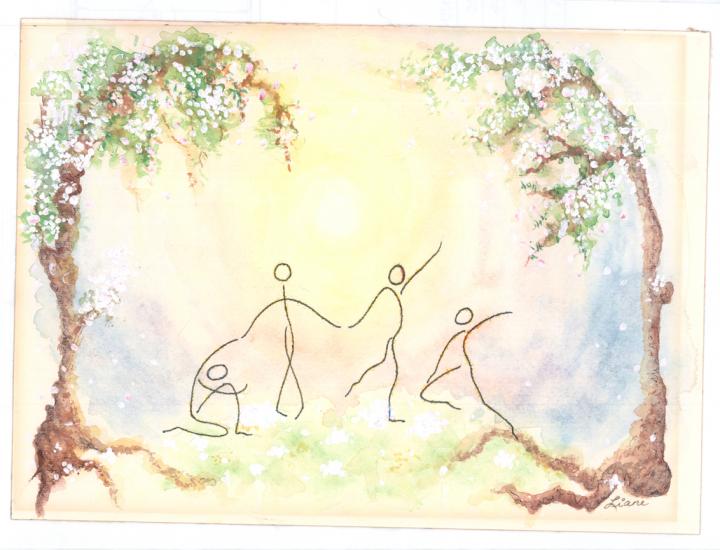Cooperation among biologically unrelated individuals is uniquely human

Credit: Painted by: Liane Gabora
While the capability for organisms to work together is by no means novel, humans possess an unparalleled capacity for cooperation that seems to contradict Darwinian evolutionary principles. Humans often exhibit traits–such as sympathy, loyalty, courage, and patriotism–that prioritize collective well-being over individual fitness, and often cooperation occurs among individuals with no shared biological relation. This behavior, likewise, adapts in response to changing conditions, demonstrating the flexible nature of human cooperation.
In “Identity, Kinship, and the Evolution of Cooperation,” published in Current Anthropology, Burton Voorhees, Dwight Read, and Liane Gabora argue that humans’ tendency toward these cooperative traits–or ultrasociality–sets them apart. Voorhees, Read, and Gabora assert that components of human cooperation–especially cooperative behavior between unrelated individuals–are unique, and the authors suggest that existing theories lack explanations for how this distinctly human shift to cooperative behavior arose and how cooperation is maintained within a population.
Expanding upon the current literature, Voorhees, Read and Gabora present a theory that attributes unique elements of human cooperation to the cultivation of a shared social identity among members of a group. The authors propose that evolutionary developments in the brain enabled the acquisition of this shared identity by providing humans with the capability for reflective self-consciousness. Reflective self-consciousness allows an individual to fully recognize their own personhood and point of view. In turn, recognition of their own experiences aided humans in identifying similar mental states in others, allowing humans to view themselves as part of a collective unit.
The authors argue that cultural idea systems such as kinship systems, provided the necessary framework for cultivating this unique degree of cooperation among humanity. Unlike culture-gene theories where group characteristics develop from individual traits, cultural idea systems provide a top-down, organizational structure that establishes expectations of behavior among individuals in a group and leads individuals to view other members as kin. As individuals are indoctrinated, or enculturated, in these systems, their worldviews are shaped. They develop an understanding of accepted cultural norms, how to interpret their environment and their experiences, and how to interact with one another. In particular, the authors assert that enculturation fosters feelings of obligation toward cultural kin.
Emphasizing linkages between psychology and behavior, the authors suggest this obligation deterred individuals from deviating from accepted behaviors and in turn, sustained cooperative behavior within the group. A shared social identity provided beneficial advantages. As a result, the authors propose that an association developed between an individual’s social identity and their survival instincts. In kinship systems, emotions are experienced within a specific cultural context, resulting in culture-laden mental feelings that prompt behavior. Voorhees, Read, and Gabora likewise argue that external cues contradicting existing culture-laden mental feelings can result in emotional reactions. Any behavior that diverges from cultural norms and threatens an individual’s identity could be physiologically perceived as endangering their survival. Group members will feel driven to punish defectors in response. This theory can thus explain why failure to meet group obligations may evoke guilt in those who deviate from cultural expectations.
###
Media Contact
Marsha Ross
[email protected]
Related Journal Article
http://dx.




